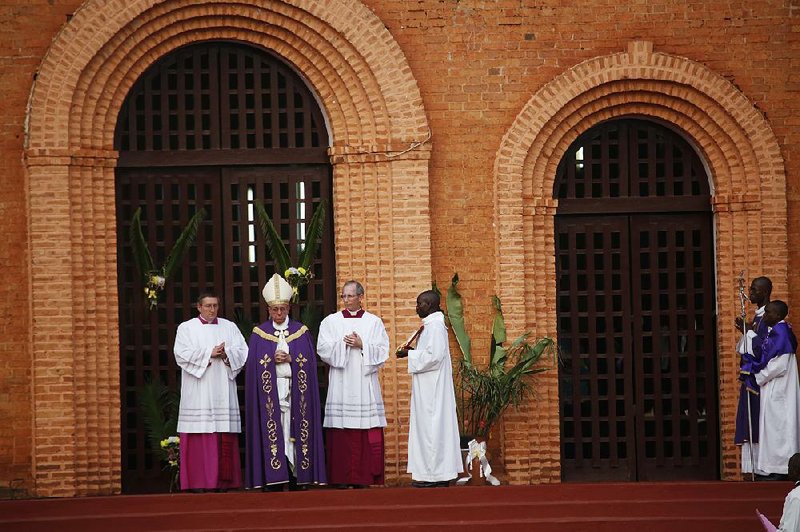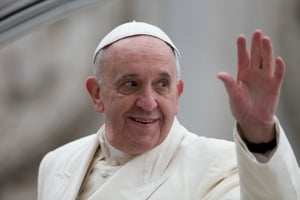BANGUI, Central African Republic -- Pope Francis visited conflict-ridden Central African Republic on Sunday and urged the country's Christian and Muslim factions to lay down their weapons and instead arm themselves with peace and forgiveness.
Flanked by Vatican bodyguards in flak jackets and machine-gun-toting U.N. peacekeepers, Francis issued the appeal from the altar of Bangui's cathedral after arriving in the divided capital on the final leg of his three-nation African tour.
Cheering crowds lined his motorcade route -- about 3 miles of it in his open-sided popemobile. The crowds swelled again at a displacement camp, where children sang him songs of welcome and held up handmade signs saying "Peace," "Love" and "Unity."
"My wish for you, and for all Central Africans, is peace," Francis told the nearly 4,000 residents in the St. Sauveur church camp. With the help of a Sango translator, he then led them in a chant: "We are all brothers. We are all brothers."
"And because we are brothers, we want peace," he said.
Sunday's visit was a rare moment of jubilation in Central African Republic, where Muslim rebels overthrew the Christian president in early 2013, ushering in a brutal reign that led to a swift and horrific backlash against Muslim civilians when the rebel leader left power the next year.
Throughout the early months of 2014, mobs attacked Muslims in the streets, even decapitating and dismembering them and setting their corpses ablaze. Tens of thousands of Muslim civilians fled for their lives to neighboring Chad and Cameroon. Today, the capital that once had 122,000 Muslims has only about 15,000, according to Human Rights Watch.
Overall, 1 million people in a country of 4.8 million have been forced from their homes.
While crowds celebrated the pope's visit and message of reconciliation, thousands of Muslims remained essentially blockaded in their neighborhood called PK5, unable to leave because of the armed Christian militia fighters called the anti-Balaka who surround its perimeter.
Francis was to enter the volatile neighborhood today to meet with the imam and Muslims in the mosque before returning to Rome.
In his inaugural Mass on Sunday night, Francis reminded the faithful that their primary vocation was to love their enemy and be courageous in forgiving and overcoming hatred, violence, persecution and injustice.
"To all those who unjustly use weapons in this world, I appeal: Put down your weapons of death; arm yourselves instead with justice, love, mercy and authentic guarantees of peace," he said to applause.
Welcoming Francis at the presidential palace, President Catherine Samba-Panza thanked him for his "lesson in courage" in simply visiting, saying his presence showed the "victory of faith over fear."
In a nod to Francis' appeal for personal soul-searching, she offered a public confession.
"In the name of the entire governing class of this country and also in the name of all those who have contributed in some way to its descent into hell, I confess all the evil that has been done here over history and ask forgiveness from the bottom of my heart," she said.
Francis underscored the message of the need for forgiveness and mercy by hearing confessions from several Catholics at a Sunday evening vigil.
Brigitte Kanga, 50, among the thousands gathered on the lawn outside the cathedral for the Mass on Sunday, said she personally was ready to forgive but she knows not all those who suffered under the Muslim rebel regime are ready to do the same.
"Nothing is impossible but it will take time."
Members of the Muslim community, as well, said they hope the visit will improve the bleak condition they're living in. Imam Oumar Kobine Layama, president of the Central African Islamic Community, said the country's Muslims want the pope to pray for them all.
"For the reconciliation of our hearts, the hearts of all the Central Africans, and be the door -- our open door -- because we don't have a voice now, we are really living in a precarious situation that doesn't have a name."
Outside the cathedral before Francis arrived, a lone Muslim wearing a white robe and traditional Muslim cap toted a sign reading "One God. One Earth. Same Ancestor."
Adoum Silick, 45, acknowledged the risk in venturing to the grounds of the cathedral but said "sometimes we have to be courageous."
"Life is very difficult for the Muslims who remain," he said. "I am taking advantage of all the security here to come."
Information for this article was contributed by Gabriela Matthews of The Associated Press.
A Section on 11/30/2015

